in tech they teach us about product market fit. at least, losers like Eric Ries who don’t create anything themselves like to talk about it.
the concept is you don’t have a real business until you can…
- identify your ideal customer profile
- predictably onboard them to your product/service
- make more money from them than it costs to acquire them
this is also true for musicians.
below is a 30 day recap since launching my acoustic-rock album, South of Market.
distribution
nobody cares about CDs anymore because nobody has a CD player.
nowadays, distribution is synonymous with streaming. i paid $11.99 for a year of streaming on all major platforms, then made some of it back with a referral link in this seo spam blog post.
in other words, worldwide music distribution in 2017 is free.
and once you rely on an internet connection to be heard, there are several ways streaming platforms can dictate your popularity, music notwithstanding.
for example, here’s what my Spotify page looked like on Day 1:
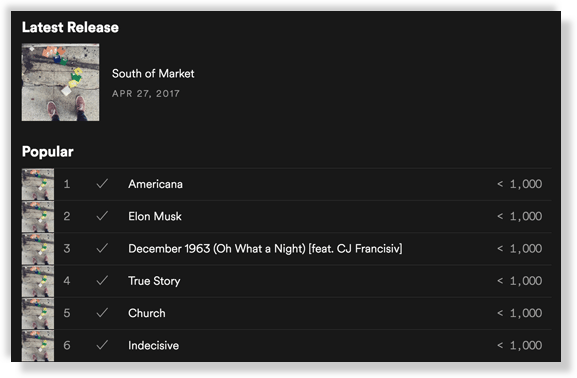
see those “< 1,000” markers?
what prospective, skeptical fan, who is probably only checking out your music because you emailed them about it, will feel better about the listening investment with stats like these?
it’s a double-edged sword, of course. with time, you get new stats…
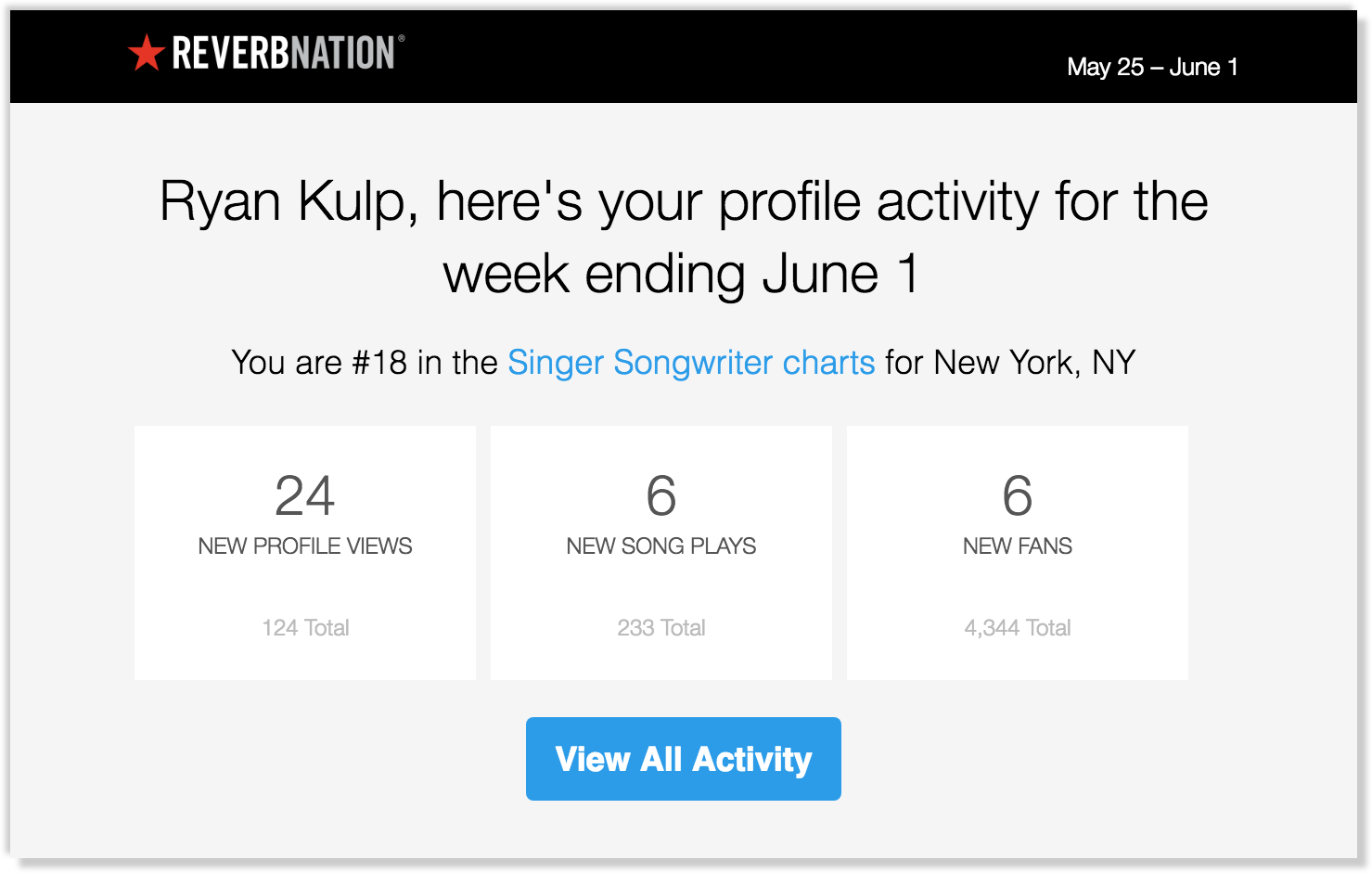
this is by no means impressive, but being #18 led to more daily plays than #40, or where i started, #300. no change to my music, just a number on a chart.
lesson: what they say about your music is more important than the music itself.
merch
i love being creative. i enjoy blowing money to make a point and piss people off.
while writing this album i observed how the Hipster Thing is to print limited edition copies of your record on vinyl. t-shirts and pin-back buttons are out.
but since i’m not a Hipster™, and because i left a career in technology, i released my album on limited edition Floppy Discs instead.
explicit self-promotion is also not a Hipster Thing, so i only sold a few of these.
result: the experiment flopped (sorry i had to).
on the flip side, i now understand more about various compression strategies than most people, including the entire staff of HBO’s Silicon Valley.
lesson: nobody wants to buy your music. they want to pay for no commercials on Spotify and get your music for free.
market research
this is tough for artists.
if you have a new toy concept, for example, you can produce crude prototypes and pay parents to “loan” you their child’s attention span for a couple hours to play with them.
based on the kid’s reaction to your toy prototype, you can decide whether or not to manufacture a million more toys.
unfortunately, a song (or any piece of art) takes about the same effort to create whether you record it (manufacture) or not.
and the song’s frontend load — the feeling — will always matter more than the recording quality, no matter what they tell you in audio production school.
that said, i did collect quantitative and qualitative feedback for my album. here’s a snapshot of feedback i collected through Crowd Review:
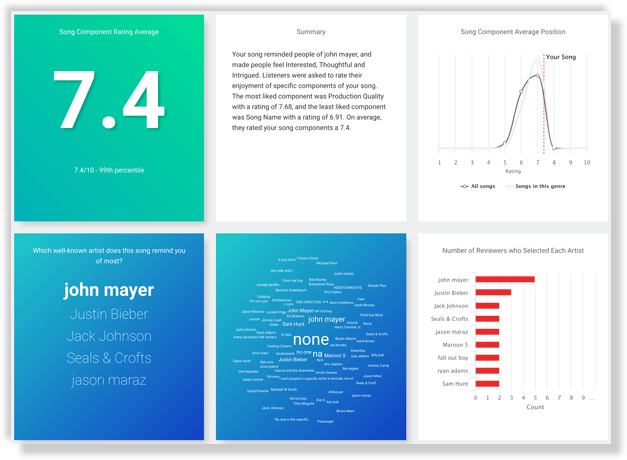
“hit” songs score 9+, and i got a 7.4.
the named influences (mayer, bieber, jack johnson) are reasonable gestures by listeners without an ear for music, but a bummer to receive as an artist.
here’s more:
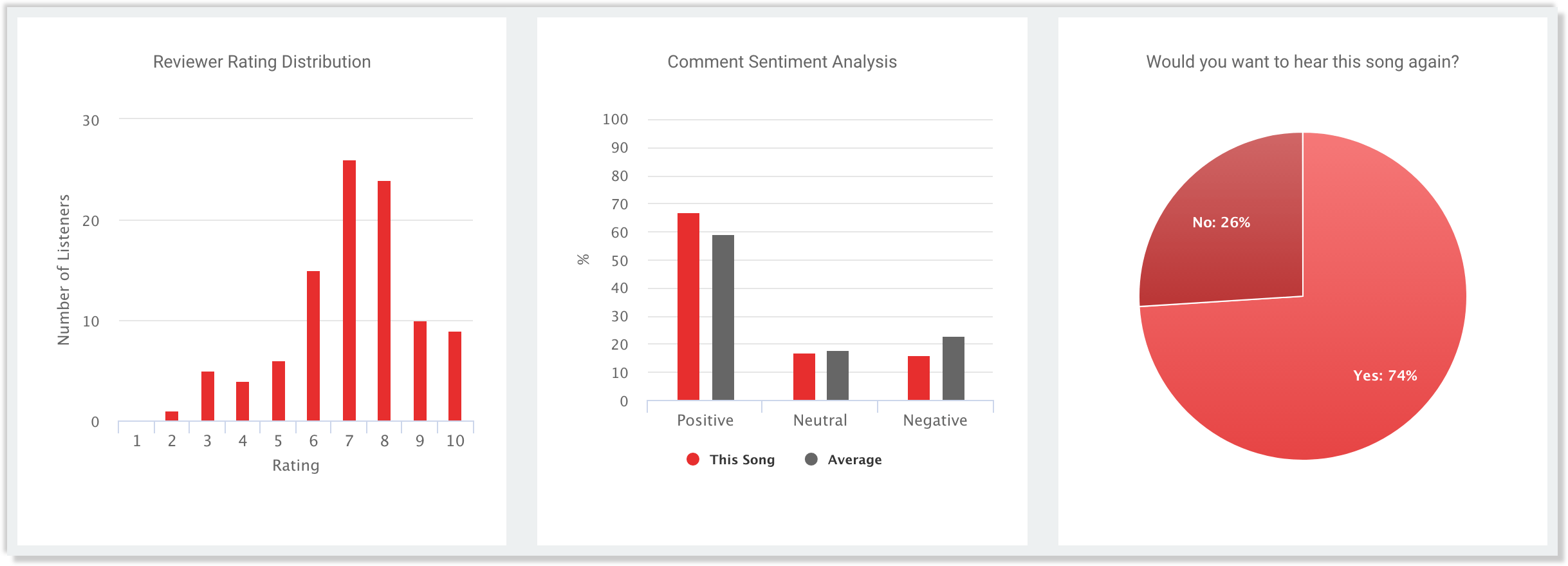
i’m glad people would listen again, and think the music is positive. regardless of how my style changes in the future, positivity and a replay factor are crucial.
now for qualitative feedback.
i sent this email to 12 people:
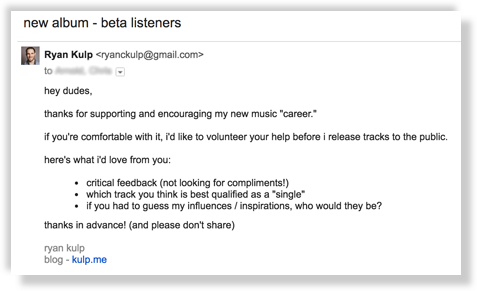
the key component was asking for specific feedback.
a simple “what do you think?” yields binary and shallow answers, e.g. “sounds like John Mayer” from the 100-listener survey above.
another aspect of this request was my permission to be critical.
i’ve found that most folks are wimps and refuse to criticize their friends for fear of repercussion. since i don’t have many friends, i had no problem establishing this table stake.
by explicitly stating my openness to critical feedback, i got what i really wanted.
below is a raw, unedited sample of exactly that:
“it sounds like it would be a B-side release from 2004. songwriting & production sound a little dated. i’m not saying people don’t still listen to that stuff, but it struck me as being very Plain White T’s, you know?
which would be fine if the world hadn’t had the Plain White T’s be a thing, but they were a thing, and we all moved on, and now we listen to trap and EDM and a whole bunch of other nonsense.
jason mraz still makes a living, but jason mraz came up during the time where people wanted to listen to that. i’m not sure people are clamoring for more plain white ts?
vocals need more processing across the board, they’re too raw for the style you’re going for. a teeny bit of the right reverb goes a long way. needs to be compressed and leveled but you mentioned this hasn’t been fully mixed so i won’t harp on that too much.
dynamics, dynamics, dynamics. a little lacking here. songs sort of start and end at the same energy level – this is partially a volume thing, but mostly an arrangement thing. it’s what turns “good” into “great.”
you’ve stuck to the building blocks of traditional songwriting structure really well. maybe too well. there was nothing in here that made me go, ‘holy shit that’s great’ or ‘holy shit that’s terrible.’
the question i really want you to answer for me, and for yourself, is: what is this music supposed to make me feel?”
if you want to see all of the qualitative feedback i received, go here.
but no matter how many resources you have for collecting and analyzing data about your art, you should think deeply about whether your creation lives up to your own expectations.
before reading any of the above feedback, i felt that:
- the genre feels 10 years old
- it’s not catchy enough
- lyrics are too personal
- doesn’t make you want to move
in the same way tech founders overvalue their code, many musicians presume their song is a “smash” or their beat is “fire.” and they’re usually wrong.
so my advice here is to only be satisfied with commercial art when your gut matches the gut of others.
it is at that intersection where you are probably closest to the truth.
and with this combination of outsiders’ feedback and my own, we agree: South of Market is not very good.
lesson: do better next time.
building a fanbase
a few months ago, when i knew i’d transition from tech to music, i launched groupies.
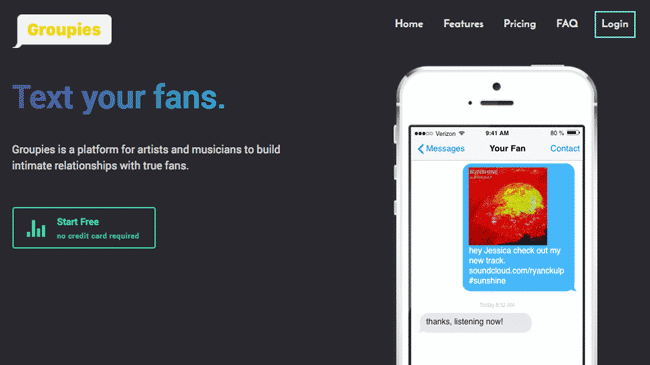
i thought, “when i become a musician, i’ll use this to text my fans and build real relationships!”
false.
i never logged into Groupies during the creation or release of this album.
however, i have been in touch with major record labels who want to use Groupies for their own artists.
so while it didn’t turn into a marketing channel for my own music, it could become a ‘funder’ of future ryan kulp music marketing channels.
here’s what i did do.
beyond streaming services like Spotify and iTunes, i made profiles on…
Reverb Nation
Fanburst
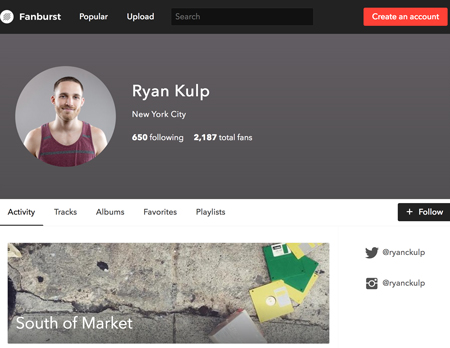
SoundCloud
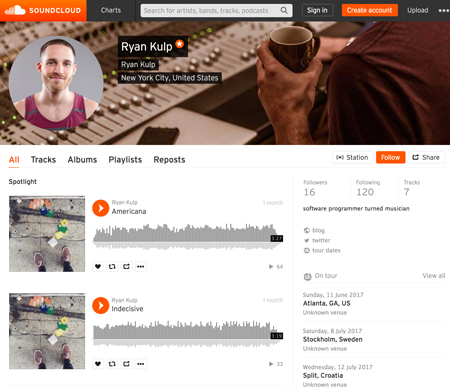
…and even Sonicbids.
[img redacted, sonicbids sucks]
while these platforms have varied features and traction, what they all have in surplus is musicians and what they all lack in desperation is listeners.
for example, there are over 22,000 artists on Fanburst. but how many of them consume vs create?
let’s figure it out with common sense and a bit of code.
step 1 – learn what happens when you get a new follower
an hour after creating my profile on Fanburst, i got this email:
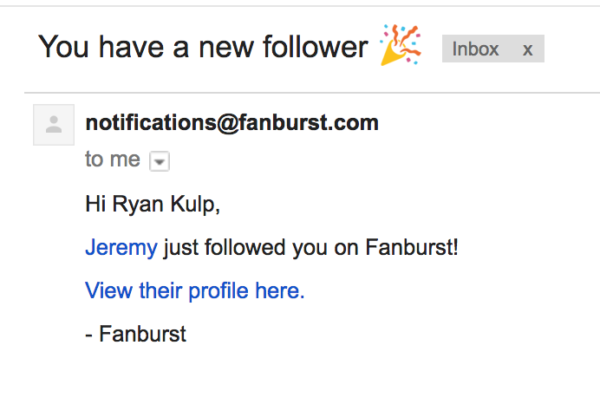 as an artist, this was a boost of satisfaction. “it’s working! i’m getting fans!”
as an artist, this was a boost of satisfaction. “it’s working! i’m getting fans!”
as a marketer, i smelled bullshit. after all, i hadn’t uploaded any music, so there was nothing discoverable about my profile.
so i dug in to figure out who this “jeremy” guy is.
the usual suspects (angellist, crunchbase, etc) had nothing. there’s also no Team page on the website. then i checked out the Privacy Policy.
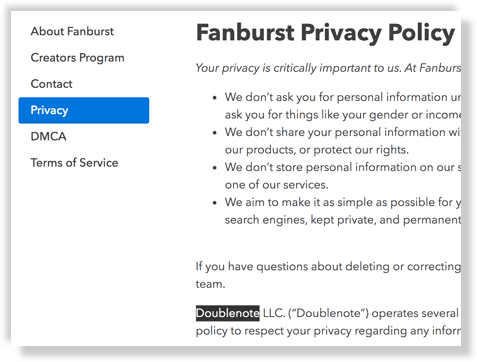
ok, so the company is actually called “Doublenote.” let’s google it.
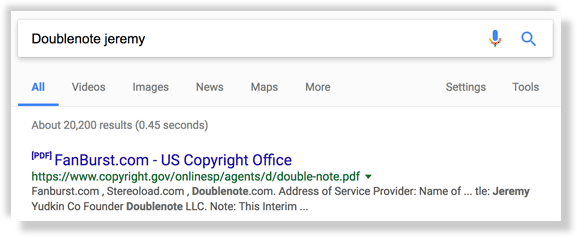
crack open the first link, a Copyright infringement claim…
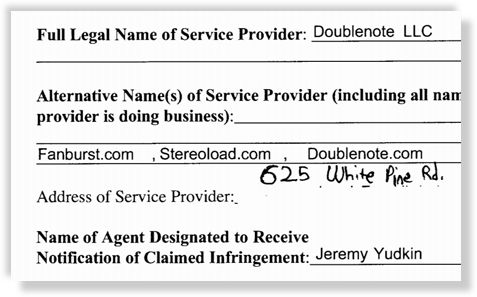
Bingo. jeremy is the founder of Fanburst. this was an auto follow.
step 2 – auto follow everyone
if Jeremy’s auto follow on my profile resulted in an email to my inbox, wouldn’t my follows to other profiles do the same thing?
let’s write some code.
every profile on Fanburst is recognized on the frontend by its Primary Key ID. this is a no-no for social networks, because serialized object IDs == scraper’s dream.
what the above does, is imitates the “follow” and “unfollow” buttons being clicked, by passing in the user’s credentials with a token/cookie combination and an integer ID.
here’s the script in action:
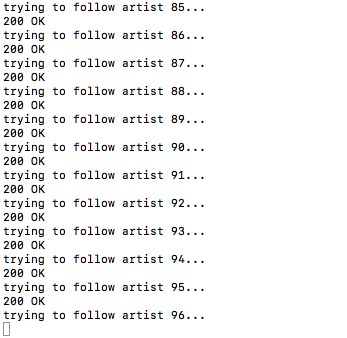
results
i did this for a few days, following and unfollowing 650 users per day.
it worked.
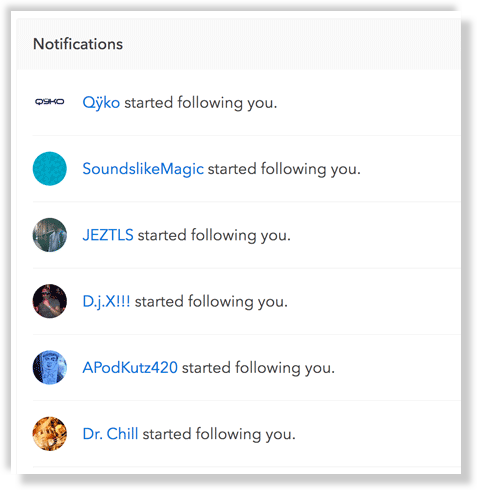
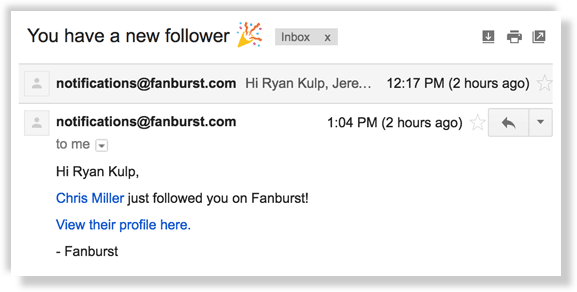
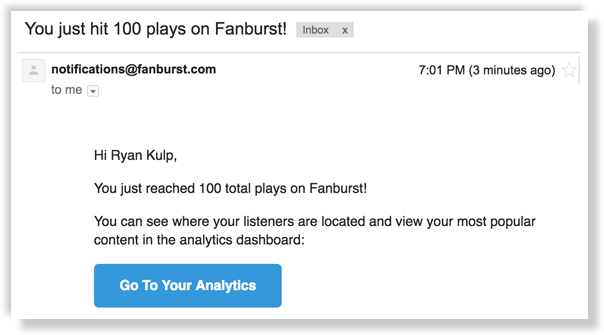
then i did the same thing on Soundcloud…
ok, you get it.
lesson: automation can kickstart a few hundred listeners, but it’s not sustainable.
getting press
if small hacks and 1 to 1 fan-building aren’t your thing, it makes sense for Other People to talk about you.
a few months ago while browsing Indie Hackers, i discovered SubmitHub. it’s a marketplace that connects artists with journalists who write about new music.
there’s a free option to send journalists your tracks, but you can also buy “credits” which guarantee a play + response.
i found a 10% off coupon, then bought 50 credits for $36.
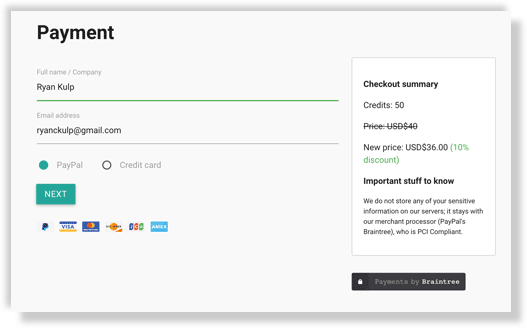
by leaning on the feedback i received from the 12 beta listeners, i chose Americana and Indecisive as the 2 most-single-ish tracks on the album, and sent them to 11 and 7 bloggers, each.
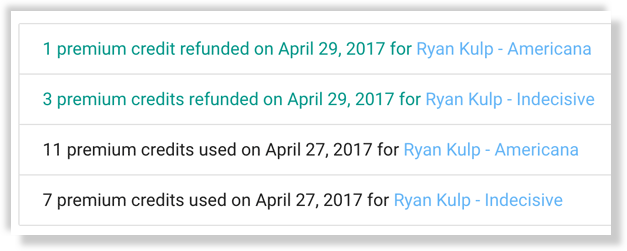
while i spent 18 credits ($12.96 worth), 4 were refunded due to a non-response from the blogger.
result: 1 shoutout, which you can read here.
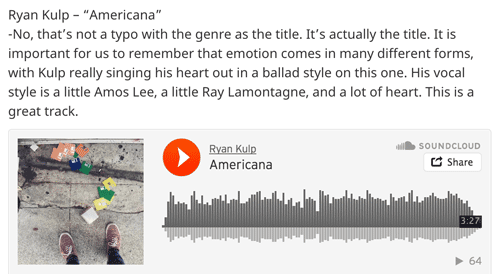
Reverb Nation also has a press-friendly featured called Opportunities, which is just $10 /month.
an opportunity is essentially a promotional email blast, like “free mastering” or “open for band XYZ in philadelphia.”
artists can apply for Opportunities with 1 click, so it’s a no brainer for musicians on the go. since i’m still running a growing company, the streamlined nature of Opportunities is perfect.
in ~33 days i submitted to 46 different opportunities.
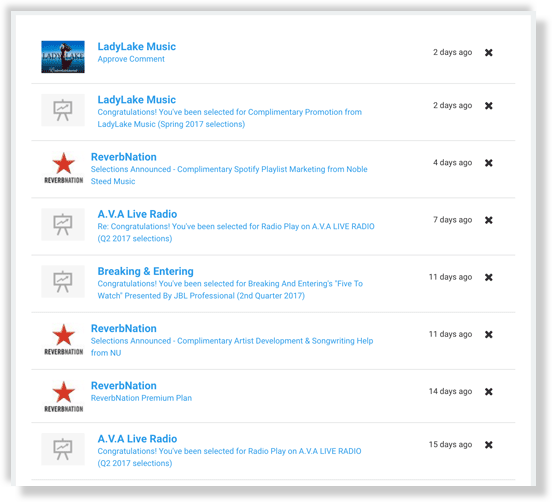
result: 3 shoutouts, a 6.5% conversion rate.
- AVA Live Radio (played on live station + DJ mention)
- Five to Watch (sponsored by speaker company JBL, hosted on Breaking and Entering)
- Lady Lake Music (selected this week, awaiting publication)
Gab is a new social media platform that’s gotten a lot of attention and hate for being filled with conservatives. how dare our populace not bleed from thine own heart!
by engaging slightly with the platform, i picked up a decent following and started talking about my music.
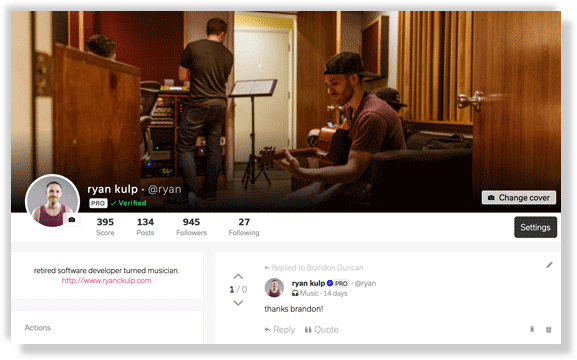
result: 1 feature story.
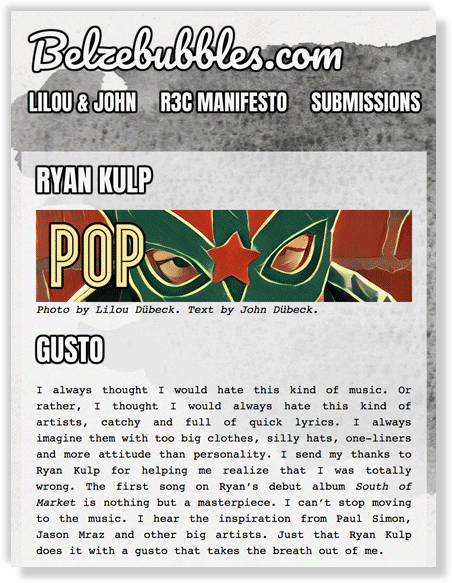
it’s a long interview, but you can read it here.
that’s enough PR for me.
virality
it’s not exactly “remarkable” when a twentysomething white dude releases an album on acoustic guitar.
to combat this, i told a different story: Silicon Valley tech executive becomes a full-time musician.
as Godin says, All Marketers Are Liars Tell Stories.
this worked OK, and it’s not disingenuous. i really did leave a high paying, full-time job in San Francisco to pursue music.
but the story isn’t everything, you also need meat on the bones.
so i tried two things:
- troll a public figure in the tech industry
- create nostalgia
trolling
this is one of the things i do best.
my twitter reach in a 2 hour timespan, 2 nights ago. thanks haters pic.twitter.com/28iqjGha20
— ryan kulp (@ryanckulp) December 31, 2016
why not apply it to songwriting?
during a bourbon-ish conversation with my friend Alex, he said:
“A song will never get us to Mars… music as we know it is on the way out.”
after further thought, the second track on my album is called Elon Musk. the opening limerick?
“they said a song will never get you to Mars…”
while Elon isn’t exactly an easy guy to get in touch with, i did meet his ex-wife in Dallas, and his ex-cofounder Peter Thiel in Washington DC.
so i figured, how hard could it be?
.@elonmusk i'm a retired silicon valley tech exec. just switched careers to music. named a song after you. :) https://t.co/2Gj0MwPTLh
— ryan kulp (@ryanckulp) April 27, 2017
result: nothing.
nostalgia.
did you ever watch Mad Men? this scene, the Carousel pitch, is among the best.
to do something similar with the album, i covered the world-famous hit single, December 1963.
9,000 plays later, it got an OK response. the stats are nothing to brag about, but i do encourage you to listen since my friend CJ killed a rap interlude.
lesson: maybe next time.
performing
no musician would be taken seriously if they didn’t play live.
after launching my album, i played 3 shows in Seattle and Nashville.
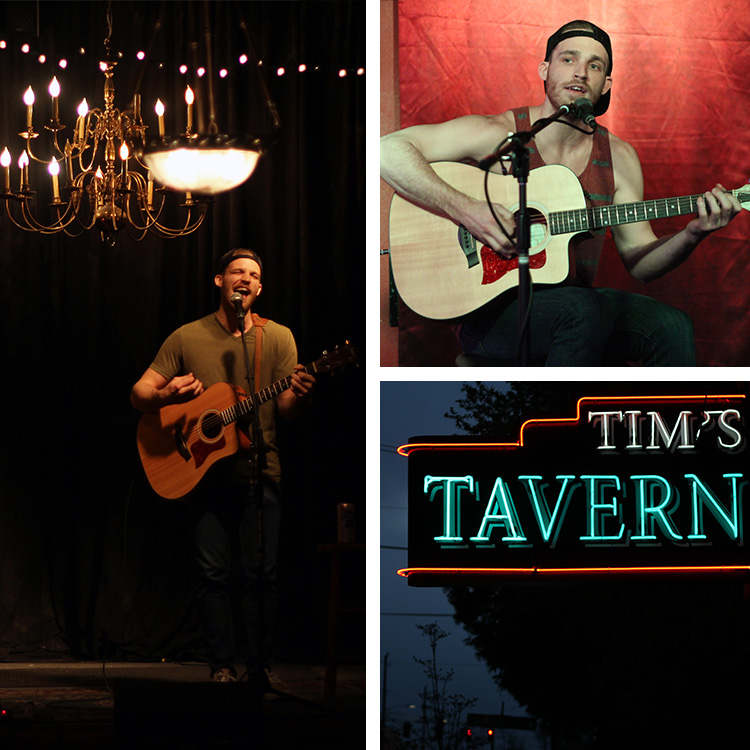
the audience reception was positive, and a handful of folks came up to me afterwards with personal compliments.
result: zero new email subscribers or merch sales.
i’m playing a few more gigs this year, but am not holding my breath for ground-breaking outcomes.
community
while i’ve been busy in tech since 2012, my peers in the music industry have leveled up on all things promotion –> networking. or so i thought.
to catch up on the latest industry expertise, i started listening to the DIY Musician Podcast. i also subscribed to New Artist Model, a musician / business resource from prolific writer Dave Kusek.
if i had to summarize the music marketing landscape in a word, it’s weak.
top tier professionals at music industry conferences are still telling artists how to “get a twitter handle with their band name” and to “make sure your band name is available as a domain.”
if this advice was shared at a startup conference, you’d be laughed off stage. and if it needed to be shared at a startup conference, the founders in attendance would be laughed out of the building.
essentially, most musicians haven’t evolved to do more than their craft: music.
put another way, a quote from Tommy Darker’s footer: “A Musician Who Is Just A Musician Can Never Become A Good Musician.”
so, i’m considering launching a podcast where i interview full-time musicians about how they sell themselves. more on that later.
with 1,000 true fans in mind, i open sourced my lyrics:
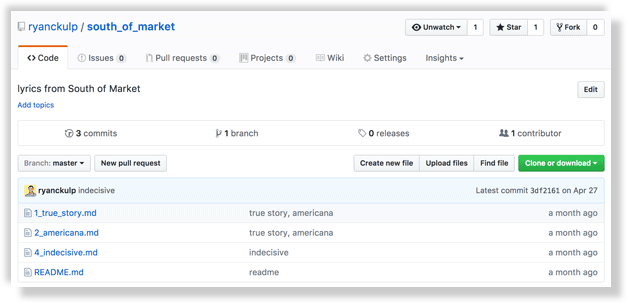
i thought this would encourage startup folks to support a peer’s non-tech venture.
result: i never told anyone in tech about the album, much less the target geography — South of Market.
next, i annotated my album’s lyrics on Genius:
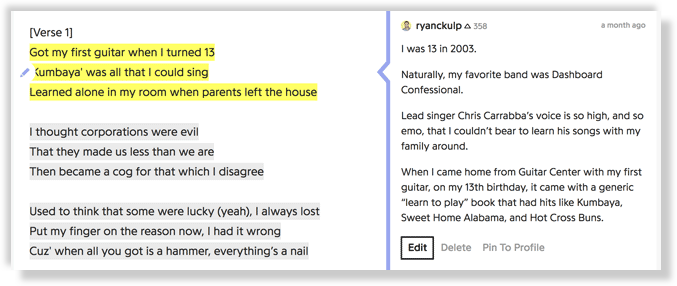
this was fun, and i’m glad i did it.
my lyrics are honest and personal, and friends / lurkers have enjoyed reading them. but, it didn’t exactly create a bump in my listenership.
advertising
prior to recording South of Market, i brainstormed a laundry list of ideas for promoting it.
some of these ideas were wacky ad concepts, like getting a billboard by the Caltrain stop at 4th / King Street. or cold-emailing sales teams free leads (CSV files) if they listened to the album.
after releasing + listening + collecting feedback, however, i decided against heavy investment.
what i did try, though, is Facebook ads through Reverb Nation.
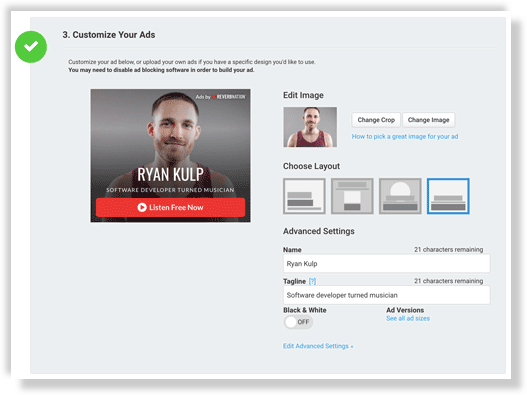
as you can see above, they have a nifty WYSIWYG builder that removes the pain of graphic design from marketing.
here’s another ad this created, without any skills on my end:

because i was a new user to the Reverb Nation platform, i got around $40 in free clicks on these ads.
result: several streams, maybe 2-3 subscribers.
what’s next
i don’t listen to my own album anymore.
a day after releasing it, i picked up home recording gear for better demos and modern [synth] sounds. acoustic rock is dead.
i also sat down with Cutting Room Studios, where i intend to record a few singles this summer. expect something soon, before your neighborhood pool gets the first poop scare.
next, i’ve been accepted into the Fall 2017 batch of Crē•8 Music Academy.
this is a ~5 week expansive music production curriculum that will help me write, record, and produce my music before i distribute it to the next wave of ryan kulp fans.
the courses are presented in partnership with Westlake Studios, a renowned recording studio in West Hollywood with clients that include everyone from Michael Jackson to The Chainsmokers.
summary
within 30 days of launching South of Market, i spent 10 hours promoting it.
this generated:
- 2,000 streams – original music
- 4 PR mentions
- 9,000 streams – cover song
- a few floppy disc sales
- several email subscribers
- a songwriting wakeup call
i’ve benefited tremendously from meditating on critical feedback, listening to new genres, and curating tools and resources to inspire my next release.
this blog post is the beginning and end of South of Market, but a new era awaits.
Los Angeles, i’ll see you in October.
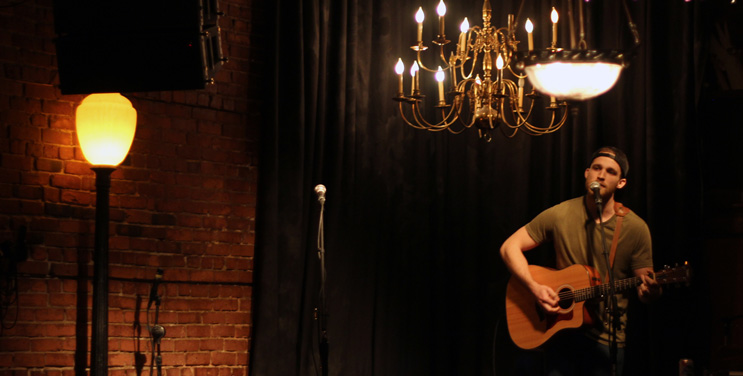
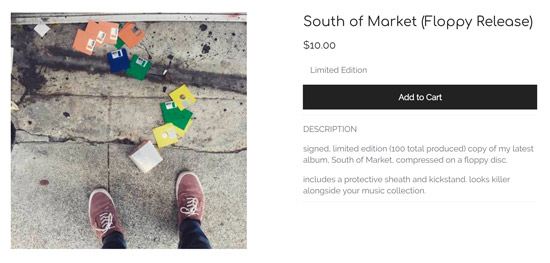
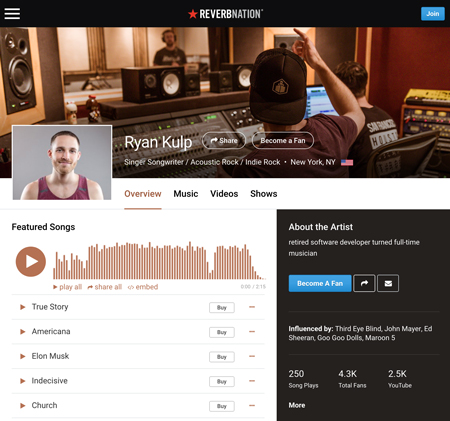
surprised to see that you did not use DistroKid as the founder seems to be cut from the same cloth https://news.distrokid.com/what-ive-been-up-to-for-the-past-4-years-ef06ab9c5cd6 and is effective in the music world (proof is in his stats)
hey Jonathan, i did indeed use DistroKid! but, distribution technology != distribution.
really cool niche read. i was a musician for 6 years, released an album in 2013. i knew next to nothing about marketing and advertising, about launching. typical “build it and they will come”. but interesting to see that despite all the activity, you still found no clear winning strategy. a lot of what i know about successful rappers at least is that they always start out with a grassroots movement, from their block, to the hood, to the city, to regional, to national, to worldwide in the end. DJs are still a huge part of the machine, and ultimately it’s about networking + product + targeted marketing
why you are calling eric ries as loser? i am just shocked.